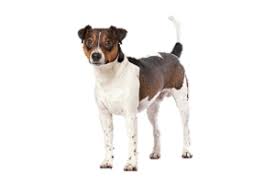
Danish–Swedish Farmdog
Conditions of detention
Danish-Swedish Farmdogs are adaptable and thrive in both rural and suburban settings. They enjoy having space to roam and play but can also do well in apartments if given sufficient exercise.
Useful Fact: These dogs benefit from having access to a secure yard where they can explore and burn off energy.
Nutrition and diet
A balanced diet with high-quality proteins, fats, and essential nutrients is crucial for maintaining the health and energy levels of Danish-Swedish Farmdogs. Both high-quality commercial dog food and well-balanced homemade diets can meet their nutritional needs.
Useful Fact: Dividing their daily ration into two meals helps maintain stable energy levels and prevent overeating.
Health
Danish-Swedish Farmdogs are generally healthy, with a lifespan of around 12-15 years. They can be prone to certain conditions such as hip dysplasia and patellar luxation. Regular veterinary check-ups and maintaining a healthy weight are essential.
Useful Fact: Regular exercise and a balanced diet can help prevent common health issues and maintain their overall well-being.
Grooming and care
Danish-Swedish Farmdogs have a short, dense coat that requires minimal grooming. Regular brushing helps remove loose hairs and keep their coat healthy. Bathing should be done occasionally, as needed.
Useful Fact: Regularly checking and cleaning their ears helps prevent infections, especially for dogs that are active outdoors.
Education and training
These intelligent and eager-to-please dogs respond well to positive reinforcement training methods. Early training and socialization are crucial to ensure they develop into well-behaved and confident adults.
Useful Fact: Short, engaging training sessions work best, as they can become bored with repetitive tasks.
Toys and entertainment
Danish-Swedish Farmdogs enjoy toys that challenge their minds and bodies, such as puzzle toys, fetch toys, and interactive games. They also benefit from activities that allow them to use their natural herding and hunting instincts.
Useful Fact: Providing a variety of toys and rotating them regularly helps keep them mentally stimulated and prevents boredom.
Safety
A secure yard with a high fence is essential to prevent them from wandering off, as they are curious and agile. They should always be supervised or leashed during outdoor activities in unfenced areas.
Useful Fact: Using a harness during walks provides better control and reduces strain on their neck.
Accessories
Comfortable harnesses, collars, and leashes are important for daily walks. Providing a supportive bed helps prevent joint issues, especially as they age.
Useful Fact: A grooming kit with high-quality brushes is essential to manage their coat effectively.
Socialization
Early and continuous socialization helps Danish-Swedish Farmdogs develop into well-rounded adults. Exposure to different people, animals, and environments is crucial for managing their natural instincts and ensuring confidence in various situations.
Useful Fact: Puppy socialization classes provide structured opportunities for them to learn and interact with other dogs and people.
Travel and Transportation
Danish-Swedish Farmdogs travel well when accustomed to it from a young age. Using secure crates or harnesses during car rides ensures their safety.
Useful Fact: Frequent breaks during long trips help them stay comfortable and reduce stress.
Behavior and psychology
These dogs are known for their friendly, intelligent, and alert nature. They form strong bonds with their families and can be protective. Proper training and socialization are essential to manage their independent and sometimes stubborn nature.
Useful Fact: Regular mental and physical stimulation is crucial to keep them happy and prevent unwanted behaviors.
Legal aspects
Owning a Danish-Swedish Farmdog may require adherence to local pet regulations, including licensing and leash laws. Researching and complying with local regulations ensures responsible ownership.
Useful Fact: Some areas may have specific requirements regarding the use of certain types of collars or leash lengths, so it’s important to be aware of these.


